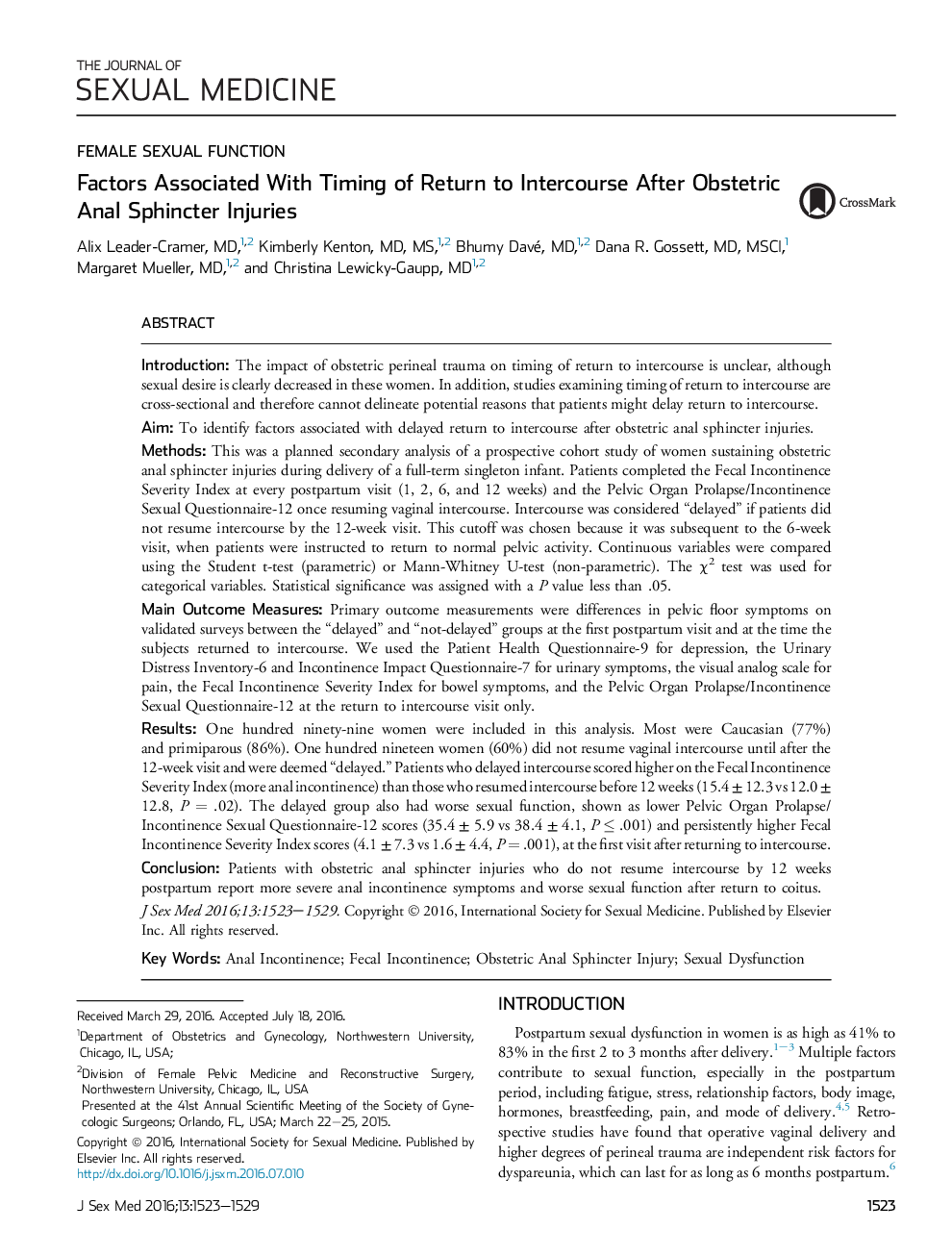| کد مقاله | کد نشریه | سال انتشار | مقاله انگلیسی | نسخه تمام متن |
|---|---|---|---|---|
| 4268957 | 1610827 | 2016 | 7 صفحه PDF | دانلود رایگان |
IntroductionThe impact of obstetric perineal trauma on timing of return to intercourse is unclear, although sexual desire is clearly decreased in these women. In addition, studies examining timing of return to intercourse are cross-sectional and therefore cannot delineate potential reasons that patients might delay return to intercourse.AimTo identify factors associated with delayed return to intercourse after obstetric anal sphincter injuries.MethodsThis was a planned secondary analysis of a prospective cohort study of women sustaining obstetric anal sphincter injuries during delivery of a full-term singleton infant. Patients completed the Fecal Incontinence Severity Index at every postpartum visit (1, 2, 6, and 12 weeks) and the Pelvic Organ Prolapse/Incontinence Sexual Questionnaire-12 once resuming vaginal intercourse. Intercourse was considered “delayed” if patients did not resume intercourse by the 12-week visit. This cutoff was chosen because it was subsequent to the 6-week visit, when patients were instructed to return to normal pelvic activity. Continuous variables were compared using the Student t-test (parametric) or Mann-Whitney U-test (non-parametric). The χ2 test was used for categorical variables. Statistical significance was assigned with a P value less than .05.Main Outcome MeasuresPrimary outcome measurements were differences in pelvic floor symptoms on validated surveys between the “delayed” and “not-delayed” groups at the first postpartum visit and at the time the subjects returned to intercourse. We used the Patient Health Questionnaire-9 for depression, the Urinary Distress Inventory-6 and Incontinence Impact Questionnaire-7 for urinary symptoms, the visual analog scale for pain, the Fecal Incontinence Severity Index for bowel symptoms, and the Pelvic Organ Prolapse/Incontinence Sexual Questionnaire-12 at the return to intercourse visit only.ResultsOne hundred ninety-nine women were included in this analysis. Most were Caucasian (77%) and primiparous (86%). One hundred nineteen women (60%) did not resume vaginal intercourse until after the 12-week visit and were deemed “delayed.” Patients who delayed intercourse scored higher on the Fecal Incontinence Severity Index (more anal incontinence) than those who resumed intercourse before 12 weeks (15.4 ± 12.3 vs 12.0 ± 12.8, P = .02). The delayed group also had worse sexual function, shown as lower Pelvic Organ Prolapse/Incontinence Sexual Questionnaire-12 scores (35.4 ± 5.9 vs 38.4 ± 4.1, P ≤ .001) and persistently higher Fecal Incontinence Severity Index scores (4.1 ± 7.3 vs 1.6 ± 4.4, P = .001), at the first visit after returning to intercourse.ConclusionPatients with obstetric anal sphincter injuries who do not resume intercourse by 12 weeks postpartum report more severe anal incontinence symptoms and worse sexual function after return to coitus.
Journal: The Journal of Sexual Medicine - Volume 13, Issue 10, October 2016, Pages 1523–1529
